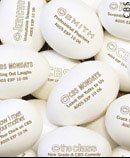Every so often, a trend pops out at you. It may even seem downright unavoidable. The train of thought runs you over before you have a chance to think about it. This week has revealed such a happening.
Here are three slightly scary examples of the progressing passion for premier produce!

Vegiforms are plastic molds inside of which fruits or vegetables are grown. As they grow, the fruits or vegetables are pressed against the mold and when they are removed, out comes an eggplant elf, or perhaps a cucumber clown.

Disney, through its Imagination Farms division, is launching the Disney Garden brand of produce. More or less like any other fresh, Florida-grown consumables but with stickers of beloved Disney characters plastered all over. They quote a grandmother who believes that she will be able to have her granddaughter shiver with the same level of enthusiasm over the Disney-laced produce as the young girl does over hot chocolate and candy.

Finally, there is the CBS partnership with EggFusion to laser engrave 35 million eggs with the broadcast company's eye insignia and catchy phrases to promote their television programming. Examples of the taglines include, but unfortunately are not limited to, "Crack the case", "Hard boiled drama", and "Shelling out laughs".
Feel free to shake your head in disbelief on behalf of everyone who has yet to hear of these.
Here are three slightly scary examples of the progressing passion for premier produce!

Vegiforms are plastic molds inside of which fruits or vegetables are grown. As they grow, the fruits or vegetables are pressed against the mold and when they are removed, out comes an eggplant elf, or perhaps a cucumber clown.

Disney, through its Imagination Farms division, is launching the Disney Garden brand of produce. More or less like any other fresh, Florida-grown consumables but with stickers of beloved Disney characters plastered all over. They quote a grandmother who believes that she will be able to have her granddaughter shiver with the same level of enthusiasm over the Disney-laced produce as the young girl does over hot chocolate and candy.

Finally, there is the CBS partnership with EggFusion to laser engrave 35 million eggs with the broadcast company's eye insignia and catchy phrases to promote their television programming. Examples of the taglines include, but unfortunately are not limited to, "Crack the case", "Hard boiled drama", and "Shelling out laughs".
Feel free to shake your head in disbelief on behalf of everyone who has yet to hear of these.